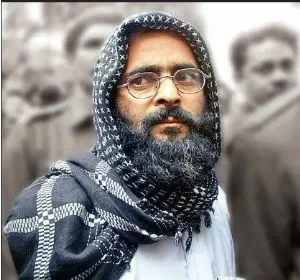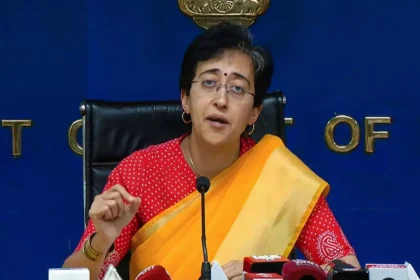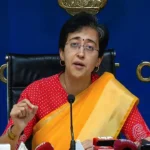Introduction:
The appointment of Atishi Marlena Singh as the new Chief Minister of Delhi has stirred significant controversy within India’s political landscape. Aam Aadmi Party (AAP) Rajya Sabha MP Swati Maliwal has emerged as one of the most vocal critics of this decision, raising concerns about Atishi’s family background and potential implications for national security. Maliwal’s criticisms particularly focus on Atishi’s parents’ involvement in a mercy petition for convicted terrorist Afzal Guru. This article explores the depth of Maliwal’s criticism, AAP’s response, the historical context surrounding Afzal Guru’s execution, and the broader implications for Delhi politics and national discourse.
Background on Atishi's Appointment:
Atishi Marlena Singh was appointed as Delhi’s new Chief Minister following Arvind Kejriwal’s resignation amidst ongoing legal issues related to the Delhi liquor policy case. AAP, which has been at the forefront of Delhi’s politics for over a decade, saw Atishi as a natural successor to Kejriwal. Over the years, Atishi has been a prominent figure within AAP, contributing significantly to policy-making and governance in Delhi. She held key portfolios such as Education, Public Works Department (PWD), Culture, and Tourism, and was a close advisor to former Deputy Chief Minister Manish Sisodia. Her work in education, especially the introduction of the ‘Happiness Curriculum,’ gained widespread recognition.
Atishi’s appointment was seen as a strategic move by AAP to maintain its reformist agenda in Delhi, especially during a tumultuous period marked by controversies and legal challenges. By elevating Atishi to the Chief Minister position, AAP aimed to ensure continuity in its governance model, which emphasizes education, healthcare, and grassroots participation.
Swati Maliwal's Criticism:
Swati Maliwal, an AAP member, has been outspoken in her opposition to Atishi’s appointment as Delhi’s Chief Minister. On social media, Maliwal referred to Atishi as a “dummy CM,” suggesting that her leadership might be more symbolic than substantive. Maliwal’s primary criticism revolves around Atishi’s family background. She pointed out that Atishi’s parents, Vijay Singh and Tripta Wahi, had signed a mercy petition to prevent the execution of Afzal Guru, who was convicted for his involvement in the 2001 attack on the Indian Parliament. Maliwal highlighted this point to question Atishi’s suitability as the Chief Minister of a state with a complex security and political environment.
In her criticism, Maliwal expressed concerns about national security. She stated, “A woman whose family fought a long battle to save terrorist Afzal Guru from being hanged is being made the chief minister of Delhi.” This statement suggests that Maliwal views Atishi’s familial ties to the mercy petition as a potential indicator of her political ideology, which she perceives as being at odds with national security interests. By raising these concerns, Maliwal has effectively questioned the decision-making process within AAP and the implications of Atishi’s appointment on a broader scale.
#WATCH | Delhi: AAP Rajya Sabha MP Swati Maliwal says, "This is an extremely unfortunate day for Delhi. A woman like Atishi is going to become the CM of Delhi, whose own family fought a long battle to save terrorist Afzal Guru from death penalty. Her parents wrote mercy petitions… pic.twitter.com/Tr1Qgvq54C
— ANI (@ANI) September 17, 2024
Historical Context: Afzal Guru's Case:
The mention of Afzal Guru in this controversy recalls a highly sensitive period in India’s recent history. Guru was convicted for his role in the 2001 Parliament attack, an incident that profoundly impacted India’s national security policies and its relationship with neighboring countries. The attack was seen as a direct assault on the heart of Indian democracy, carried out by militants associated with Pakistan-based terrorist organizations. After a lengthy legal process that included multiple appeals, Afzal Guru was sentenced to death and executed in 2013.
The case of Afzal Guru was deeply polarizing. On one hand, many viewed his execution as a necessary step to uphold the law and deter acts of terrorism. On the other hand, there were arguments that Guru did not receive a fair trial and that his execution was driven by political motives rather than a commitment to justice. Those who opposed his execution, including Atishi’s parents, signed a mercy petition, arguing that Guru was a scapegoat in a broader political conflict. This petition sought to delay or commute his death sentence, emphasizing concerns about due process and the potential use of capital punishment as a political tool.
The controversy surrounding Guru’s execution has continued to resonate in Indian politics, often serving as a litmus test for politicians and public figures on their stance toward terrorism, national security, and human rights. The involvement of Atishi’s parents in the mercy petition is thus not merely a personal matter but a reflection of the larger ideological divides in Indian society.
Maliwal's Allegations and AAP's Response:
Maliwal’s criticism of Atishi is not an isolated incident. It is part of a broader pattern of disputes and ideological differences within AAP. By accusing Atishi’s family of fighting against the execution of a convicted terrorist, Maliwal raises questions about Atishi’s suitability as the Chief Minister of Delhi. Labeling Atishi as a “dummy CM,” she suggests that Atishi’s appointment is driven by symbolic politics rather than a substantive vision for Delhi’s future. This rhetoric implies that the real power in Delhi’s governance might lie elsewhere within AAP’s hierarchy.
AAP responded to Maliwal’s comments with strong disapproval. The party demanded Maliwal’s resignation from the Rajya Sabha, accusing her of aligning with the Bharatiya Janata Party (BJP). Senior AAP leader Dilip Pandey publicly criticized Maliwal, stating, “Swati Maliwal takes Rajya Sabha ticket from the AAP but takes the script to react from BJP.” By making this statement, Pandey suggested that Maliwal’s criticism was politically motivated and orchestrated to align with the BJP’s agenda against AAP.
The demand for Maliwal’s resignation reflects the internal strife within AAP, exposing the ideological and strategic divides that have surfaced within the party. Maliwal’s criticism is not only an attack on Atishi but also serves as a broader critique of AAP’s current leadership and decision-making processes. This controversy has further strained Maliwal’s relationship with the party leadership, particularly after her previous allegations that Kejriwal’s aide, Bibhav Kumar, assaulted her at the Chief Minister’s residence. The ongoing tension between Maliwal and AAP underscores the complex dynamics within the party, raising questions about its unity and direction.

Atishi’s Response to the Criticism:
Atishi has previously addressed the controversy surrounding her parents’ involvement in the mercy petition for Afzal Guru. In 2019, during an interview with the vernacular daily Amar Ujala, she distanced herself from her parents’ stance on the issue. Atishi stated, “I am not responsible for any political decisions made by my parents. The responsibility and accountability for those actions lie with them.” She made it clear that she did not support her parents’ position on Guru’s execution and emphasized that her political decisions and leadership would be based on her own values and convictions.
Atishi’s response reflects an effort to separate her political identity from her family background. By clarifying her stance on the matter, she aims to position herself as an independent political actor, capable of making decisions based on the current realities and demands of governance rather than being influenced by familial associations or past controversies. This distinction is crucial, especially in a political environment where personal history and family background are often scrutinized to assess a leader’s suitability for public office.
The Political Context and Broader Implications:
The controversy over Atishi’s appointment and Maliwal’s criticism must be viewed within the larger political context. AAP has been at the forefront of Delhi politics for several years, promoting a governance model focused on education, healthcare, and grassroots engagement. Atishi, as a key architect of many of these initiatives, represents the party’s progressive and reformist agenda. Her contributions to Delhi’s education system, particularly the ‘Happiness Curriculum,’ have been lauded for their innovative approach to learning and emotional well-being.
However, AAP’s tenure has also been marked by controversies and legal challenges. Kejriwal’s resignation and the legal battles related to the Delhi liquor policy case, along with the arrest of key party members like Manish Sisodia, have put the party under intense scrutiny. Atishi’s appointment was seen as a strategic move to maintain stability and continuity in the government’s functioning, especially during a time of crisis.
Maliwal’s criticism, therefore, not only targets Atishi but also serves as a critique of AAP’s current leadership and decision-making processes. By questioning Atishi’s background and describing her as a “dummy CM,” Maliwal is challenging the party’s narrative and its approach to leadership selection. Her remarks echo a broader debate in Indian politics about the role of personal history, family background, and ideological beliefs in public service. This debate raises important questions about the criteria for political leadership, the boundaries between personal and public lives, and the impact of a leader’s background on their governance style.
The Broader Political Implications for AAP:
The controversy surrounding Atishi’s appointment has significant implications for AAP’s future. It has brought to light the internal rifts within the party and the ideological tensions that exist among its members. Maliwal’s criticism suggests a growing divide within AAP between those who support the party’s current direction and those who feel that it has strayed from its original principles of clean governance and transparency.
AAP has built its political identity on being a party that champions anti-corruption, social justice, and progressive governance. However, the controversies involving its leadership, including the recent legal challenges faced by Kejriwal and Sisodia, have raised questions about the party’s commitment to these principles. Atishi’s appointment as Chief Minister was meant to signal a new chapter in AAP’s governance in Delhi, one that would continue its focus on education and welfare policies. However, Maliwal’s criticism has complicated this narrative, suggesting that internal dissent and ideological differences may be hindering the party’s ability to present a unified front.
This controversy also has broader implications for Indian politics, particularly in terms of the discourse around leadership, accountability, and the influence of personal background on public office. It highlights the challenges political parties face in navigating complex issues of ideology, leadership, and public perception in a highly polarized and scrutinized political environment.
Public and Political Reactions:
Maliwal’s criticism has sparked a wide range of reactions across the political spectrum and the public. Supporters of Atishi and AAP argue that Maliwal’s comments are an attempt to undermine a capable leader based on familial associations that have no bearing on her political decisions. They view Atishi as a competent and progressive leader whose track record in education and public policy speaks for itself. Many believe that her contributions to Delhi’s governance, particularly in the field of education, are evidence of her ability to lead effectively and bring positive change.
On the other hand, critics of Atishi and AAP view Maliwal’s criticism as a legitimate concern about the integrity and ideological stance of those in public office. They argue that a leader’s background, including their family’s actions, can offer insights into their values and potential policy inclinations, especially when it involves matters of national security. This perspective emphasizes the importance of transparency and accountability in public life, suggesting that a leader’s history and associations can have implications for their governance.
Conclusion:
The controversy surrounding Atishi’s appointment as the new Chief Minister of Delhi, highlighted by Swati Maliwal’s criticism, underscores the complexities of political leadership in India. It raises important questions about the influence of personal background on public office, the role of party unity in governance, and the impact of past political decisions on present-day politics. Atishi’s response to the criticism indicates her desire to move beyond her family’s past and focus on her responsibilities as the Chief Minister of Delhi.
Her success in this role will depend on her ability to address the pressing issues facing Delhi, from education to public health, while navigating the internal and external political challenges that come with her new position. As AAP faces internal rifts and external pressures, Atishi’s leadership will be under the spotlight. Whether she can transcend the controversy and lead effectively remains to be seen. What is clear, however, is that her appointment has sparked a significant debate, one that goes beyond party lines and touches on broader themes of governance, security, and the evolving dynamics of Indian politics.










